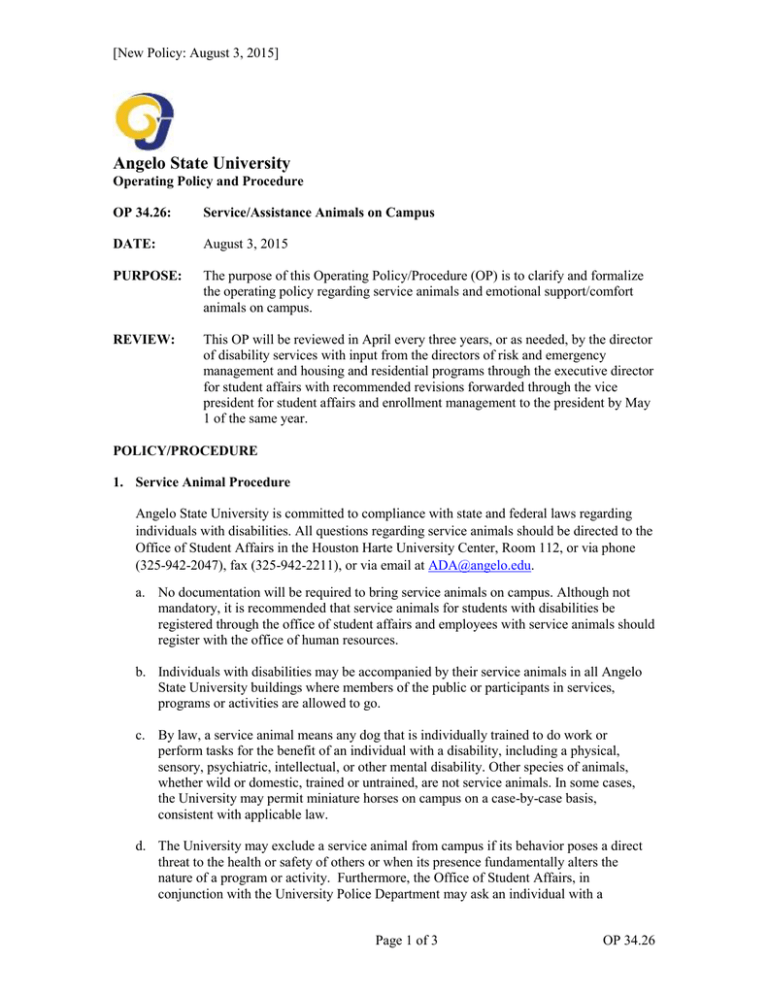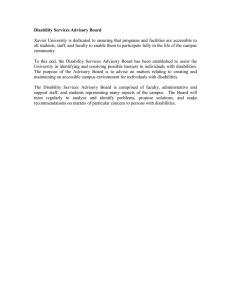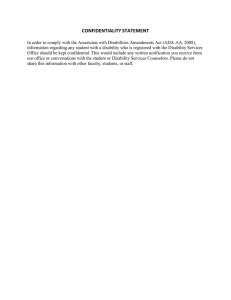Angelo State University
advertisement

[New Policy: August 3, 2015] Angelo State University Operating Policy and Procedure OP 34.26: Service/Assistance Animals on Campus DATE: August 3, 2015 PURPOSE: The purpose of this Operating Policy/Procedure (OP) is to clarify and formalize the operating policy regarding service animals and emotional support/comfort animals on campus. REVIEW: This OP will be reviewed in April every three years, or as needed, by the director of disability services with input from the directors of risk and emergency management and housing and residential programs through the executive director for student affairs with recommended revisions forwarded through the vice president for student affairs and enrollment management to the president by May 1 of the same year. POLICY/PROCEDURE 1. Service Animal Procedure Angelo State University is committed to compliance with state and federal laws regarding individuals with disabilities. All questions regarding service animals should be directed to the Office of Student Affairs in the Houston Harte University Center, Room 112, or via phone (325-942-2047), fax (325-942-2211), or via email at ADA@angelo.edu. a. No documentation will be required to bring service animals on campus. Although not mandatory, it is recommended that service animals for students with disabilities be registered through the office of student affairs and employees with service animals should register with the office of human resources. b. Individuals with disabilities may be accompanied by their service animals in all Angelo State University buildings where members of the public or participants in services, programs or activities are allowed to go. c. By law, a service animal means any dog that is individually trained to do work or perform tasks for the benefit of an individual with a disability, including a physical, sensory, psychiatric, intellectual, or other mental disability. Other species of animals, whether wild or domestic, trained or untrained, are not service animals. In some cases, the University may permit miniature horses on campus on a case-by-case basis, consistent with applicable law. d. The University may exclude a service animal from campus if its behavior poses a direct threat to the health or safety of others or when its presence fundamentally alters the nature of a program or activity. Furthermore, the Office of Student Affairs, in conjunction with the University Police Department may ask an individual with a Page 1 of 3 OP 34.26 [New Policy: August 3, 2015] disability to remove a service animal from campus if the animal is out of control and the individual does not take effective action to control it; or if the animal is not housebroken. e. The service animal is considered an extension of the student and thus, is subject to the same code of conduct as a student would follow. Disruptive behavior by a service animal will be grounds for removal from an academic setting in the same manner that a disruptive student will be removed from the same environment. 2. Responsibilities of Individuals with Service Animals The University is not responsible for the care of supervision of a service animal. Individuals with disabilities are responsible for the control of their service animals at all times and must comply with all applicable laws and regulations, including vaccination, licensure, animal health and leash laws. a. A service animal shall be restrained with a harness, leash, or other tether, unless an individual’s disability precludes the use of a restraint or if the restraint would interfere with the service animal’s safe, effective performance or work or tasks. b. If a service animal is not tethered, it must otherwise be under the individual’s control, whether by voice control, signals, or other effective means. c. Individuals are responsible for ensuring the immediate clean-up and proper disposal of all animal waste. Although the University may not charge an individual with a disability a service animal surcharge, it may impose charges for damages caused by a service animal in the same manner the University imposes charges for damages caused by students. 3. Assistance Animals in University Housing Federal law allows individuals with disabilities the presence of a broader range of animals (“assistance animals”) in University housing as compared with the campus as a whole. By law, an assistance animal is defined as an animal needed for emotional support. a. An individual may keep an assistance animal as an accommodation in University housing if: (1) The individual has a disability; (2) The animal is necessary to afford the individual an equal opportunity to use and enjoy a dwelling; and (3) There is an identifiable relationship between the disability and the assistance the animal provides. Assistance animals are NOT allowed in any other university buildings; (4) The request is approved through the Office of Student Affairs. b. The University may exclude an assistance animal from University housing if the animal is not housebroken; would cause substantial physical damage to the property of others or University facilities; would pose a direct threat to the health or safety of others, would Page 2 of 3 OP 34.26 [New Policy: August 3, 2015] fundamentally alter the nature of a program or activity; or is not being cared for by the individual. c. Students will be liable for damage caused by assistance animals in the same manner they are responsible for personal damages to University property. 4. Responsibilities of Individuals with Assistance Animals The University is not responsible for the care or supervision of an assistance animal. a. Individuals with disabilities are responsible for the control of their assistance animal at all times and for ensuring the immediate clean-up and proper disposal of all animal waste. b. Individuals must comply with all applicable laws and regulations, including vaccination, licensure, animal health and leash laws, as well as the University’s rules in lease provisions regarding vaccination, licensure, leash control, cleanup rules, animal health, and community relationships. Page 3 of 3 OP 34.26



